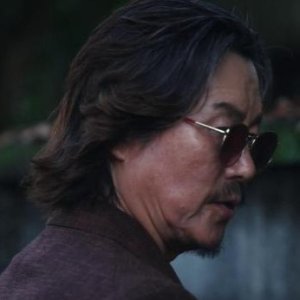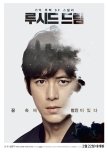This review may contain spoilers
Lucid childhood dream
Realized by Joon-sung Kim by following coincidentally a childhood dream of his, 『Lucid Dream』 (루시드 드림) follows journalist Dae-ho Choi, whose specialty is revealing big fish's misconduct, as he tries to get back his son who was kidnapped during a family outing in an amusement park. Helped by benevolent people touched by his determination, our protagonist will use not less than, as the title mentions, lucid dreams for finding his child again: an audacious artistic attempt that'll have trouble blooming, just like other elements of this particularly oneiric adventure.
And precisely, the main problem is that oneiric part, that is really over-the-top. In themselves, lucid dreams are not a problem, and basing a movie on them is rare and cool; but being able to visualize pieces of memories as lucid dreams and then to analyze them as the fancy takes one? Without mentioning the concept of shared dreams… Admittedly, the movie makes use of its science-fiction label; but sci-fi, because of its science part, has to be duly justified for one to accept to believe in it. You can't make rules out of nowhere; and the rules you set up have to be backed up if you want them to be *science* and not just *fiction*.
Speaking of fiction, the plot has noticeable loopholes. That technology for solving cold cases is incredibly efficient! so why isn't Detective Song or the police as a whole more interested in using it? Also, how can this expensive technology be so easily used by complete strangers? if at least there'd be a small sentence saying « okay, i'll use it for my research and get the funds from that », that'd make it more believable. This is the kind of details that lack but are crucial for the story elements to hold up. In addition, at the end of the movie, many points remain unsolved: what has happened to the cool disabled guy? to the chad support detective? to Detective Song?
In the same vein, the story is rather predictable. We know the father is gonna find his son, we know his son won't die, we know that himself won't die. There's no suspense. Okay, we feel surprised that the villain was actually Detective Song — but his way of thinking is weird and hard to comprehend, especially for someone supposedly as clever as a detective: how will he explain to his daughter that she survived? how will she grow up knowing her heart comes from a little boy?
But to be fair, if we put all of that aside, the movie is able to distract one neatly up till the end.
That is notably thanks to the characters, which are pretty good and well played by their actors. The only problem about the characters, is that the most interesting ones are the secondary characters: each of them is specialized in a given domain, has out-of-the-ordinary skills, and some unique or quirky personality. While the main character is really just a father chasing his son with no other personality than that… if only his past of journalist would have been more valued!
What's even sadder is that among those characters there are some renowned actors: Soo Go for the father, or the celebrated Kyung-gu Sul, who in the same year demonstrated a brilliant performance as a Korean mafioso in 『The Merciless』… For both, their performance in Kim's movie is lacking.
From another side, I noticed something particular about this movie. Several times, it reminded me of manga: manga also offers a lot of exaggeration and impossible fiction like the shared dreams, or the fact that the hero is determined, or that he meets a lot of new friends each of them having particular skills, being particularly friendly, having strong personality to the verge of eccentricity, having their own locations that look impossible to exist but you are amazed in front of them (like for real, this disabled guy's base is pretty cool)
For real, i'm pretty sure the movie would make a cool manga/manwha/comics
Finally, as for the soundtrack, it is forgettable (and i forgot it for that matter), as well as the scenery — except for one scene at the end of the movie, where we get to see a devastated city as the final glimpse someone has before dying: having delivered a nice view of what that moment could look like, we get there to see genuine artistic thought in motion, for which we can salute artistic director In-jun Hwang for his work.
All in all, 『Lucid Dream』 is quite the mainstream movie: we know where we'll arrive and few are the elements that'll surprise us. The core of the scenario is appealing, but badly implemented, as are the story, the plot and the characters to some extent — and that's too bad considering the movie's cast. But hey, if we fill just a bit the plot holes, the movie will surely make a very good manga (or rather manwha here): waiting for that now :ok:
And precisely, the main problem is that oneiric part, that is really over-the-top. In themselves, lucid dreams are not a problem, and basing a movie on them is rare and cool; but being able to visualize pieces of memories as lucid dreams and then to analyze them as the fancy takes one? Without mentioning the concept of shared dreams… Admittedly, the movie makes use of its science-fiction label; but sci-fi, because of its science part, has to be duly justified for one to accept to believe in it. You can't make rules out of nowhere; and the rules you set up have to be backed up if you want them to be *science* and not just *fiction*.
Speaking of fiction, the plot has noticeable loopholes. That technology for solving cold cases is incredibly efficient! so why isn't Detective Song or the police as a whole more interested in using it? Also, how can this expensive technology be so easily used by complete strangers? if at least there'd be a small sentence saying « okay, i'll use it for my research and get the funds from that », that'd make it more believable. This is the kind of details that lack but are crucial for the story elements to hold up. In addition, at the end of the movie, many points remain unsolved: what has happened to the cool disabled guy? to the chad support detective? to Detective Song?
In the same vein, the story is rather predictable. We know the father is gonna find his son, we know his son won't die, we know that himself won't die. There's no suspense. Okay, we feel surprised that the villain was actually Detective Song — but his way of thinking is weird and hard to comprehend, especially for someone supposedly as clever as a detective: how will he explain to his daughter that she survived? how will she grow up knowing her heart comes from a little boy?
But to be fair, if we put all of that aside, the movie is able to distract one neatly up till the end.
That is notably thanks to the characters, which are pretty good and well played by their actors. The only problem about the characters, is that the most interesting ones are the secondary characters: each of them is specialized in a given domain, has out-of-the-ordinary skills, and some unique or quirky personality. While the main character is really just a father chasing his son with no other personality than that… if only his past of journalist would have been more valued!
What's even sadder is that among those characters there are some renowned actors: Soo Go for the father, or the celebrated Kyung-gu Sul, who in the same year demonstrated a brilliant performance as a Korean mafioso in 『The Merciless』… For both, their performance in Kim's movie is lacking.
From another side, I noticed something particular about this movie. Several times, it reminded me of manga: manga also offers a lot of exaggeration and impossible fiction like the shared dreams, or the fact that the hero is determined, or that he meets a lot of new friends each of them having particular skills, being particularly friendly, having strong personality to the verge of eccentricity, having their own locations that look impossible to exist but you are amazed in front of them (like for real, this disabled guy's base is pretty cool)
For real, i'm pretty sure the movie would make a cool manga/manwha/comics
Finally, as for the soundtrack, it is forgettable (and i forgot it for that matter), as well as the scenery — except for one scene at the end of the movie, where we get to see a devastated city as the final glimpse someone has before dying: having delivered a nice view of what that moment could look like, we get there to see genuine artistic thought in motion, for which we can salute artistic director In-jun Hwang for his work.
All in all, 『Lucid Dream』 is quite the mainstream movie: we know where we'll arrive and few are the elements that'll surprise us. The core of the scenario is appealing, but badly implemented, as are the story, the plot and the characters to some extent — and that's too bad considering the movie's cast. But hey, if we fill just a bit the plot holes, the movie will surely make a very good manga (or rather manwha here): waiting for that now :ok:
Was this review helpful to you?







